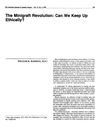 1 citations,
January 2013 in “International Journal of Trichology”
1 citations,
January 2013 in “International Journal of Trichology” The conference discussed various hair disorders and treatments, including the use of topical steroids, high doses of cetrizine, and hair grafting, as well as the psychological impact of hair loss.
 February 2024 in “Recima21”
February 2024 in “Recima21” Covid-19 can cause hair loss due to immune and psychological factors.
 February 2024 in “Bőrgyógyászati és venerológiai szemle”
February 2024 in “Bőrgyógyászati és venerológiai szemle” Psychological issues with skin problems worsen patients' lives and treatment.
 October 2023 in “Journal of the European Academy of Dermatology and Venereology”
October 2023 in “Journal of the European Academy of Dermatology and Venereology” Patients with skin diseases rated psychological effects as most impactful, needing a treatment approach that addresses both mind and body.

The document says hair loss can happen after recovering from COVID-19 and it can cause psychological discomfort.
May 2022 in “Brazilian Journal of Health Review” COVID-19 infection can cause temporary hair loss due to stress, treatment drugs, psychological impact, and pandemic-related stress.
 August 2019 in “DOAJ (DOAJ: Directory of Open Access Journals)”
August 2019 in “DOAJ (DOAJ: Directory of Open Access Journals)” Telogen effluvium is a common, distressing condition causing excessive hair shedding and has significant psychological effects on patients.
 March 2019 in “Journal of Investigative Dermatology”
March 2019 in “Journal of Investigative Dermatology” Seborrheic dermatitis is influenced by diet, genetics, and psychological factors.
 February 2019 in “IP Indian journal of clinical and experimental dermatology”
February 2019 in “IP Indian journal of clinical and experimental dermatology” Psychological stress is a major factor in the onset and severity of alopecia areata, with atopic individuals being more prone to develop it.
 January 2012 in “International Journal of Trichology”
January 2012 in “International Journal of Trichology” Psychological factors significantly affect hair health, suggesting a need for integrating mental health care in treating hair loss.
 September 1997 in “JEADV. Journal of the European Academy of Dermatology and Venereology/Journal of the European Academy of Dermatology and Venereology”
September 1997 in “JEADV. Journal of the European Academy of Dermatology and Venereology/Journal of the European Academy of Dermatology and Venereology” Psychological factors play a significant role in developing alopecia areata.
 June 1994 in “The American Journal of Cosmetic Surgery”
June 1994 in “The American Journal of Cosmetic Surgery” The article emphasizes the need for proper training and ethical practice in hair transplantation to prevent poor outcomes and psychological harm to patients.
November 2021 in “Frontiers in Genetics” The FAW-FS algorithm improves depression recognition, and psychological interventions help AGA patients' mental health.
 1 citations,
November 2015 in “Journal of Clinical Dermatology”
1 citations,
November 2015 in “Journal of Clinical Dermatology” Hair loss causes social and psychological stress, leading people to spend more on treatment, regardless of how severe the hair loss is.
 20 citations,
November 2012 in “Journal der Deutschen Dermatologischen Gesellschaft”
20 citations,
November 2012 in “Journal der Deutschen Dermatologischen Gesellschaft” Hair diseases can have psychological effects and should be treated with a combination of psychosomatic care, therapy, and medication.
 13 citations,
August 2005 in “Dermatologic Clinics”
13 citations,
August 2005 in “Dermatologic Clinics” Doctors should consider psychological factors when treating skin conditions and work with mental health experts.
 9 citations,
September 2000 in “Obstetrics and gynecology clinics of North America”
9 citations,
September 2000 in “Obstetrics and gynecology clinics of North America” Hirsutism causes significant psychological distress in women.
 7 citations,
October 2021 in “Indian Journal of Plastic Surgery”
7 citations,
October 2021 in “Indian Journal of Plastic Surgery” Hair loss patients need psychological counseling to cope better.
1 citations,
October 2016 in “Journal of medical science and clinical research” Younger males with androgenic alopecia face significant psychological impacts but maintain better quality of life.
 November 2021 in “Research, Society and Development”
November 2021 in “Research, Society and Development” Individualized treatment and psychological support are crucial for alopecia.
 January 2017 in “Acta dermato-venereologica”
January 2017 in “Acta dermato-venereologica” The congress showed that psychological therapy can help skin condition patients, social media affects acne stigma, education improves atopic dermatitis, and patient satisfaction in dermatology is high, especially with good doctor engagement.
 16 citations,
January 2011 in “Indian Journal of Dermatology”
16 citations,
January 2011 in “Indian Journal of Dermatology” Most patients with cicatricial alopecias face significant psychological and social challenges due to their hair loss.
 June 2023 in “Buletin de psihiatrie integrativă”
June 2023 in “Buletin de psihiatrie integrativă” Alopecia causes significant emotional distress and psychological issues, requiring combined skin and mental health treatment.
 January 2023 in “Editora Enterprising eBooks”
January 2023 in “Editora Enterprising eBooks” Male pattern baldness has a significant psychological impact on those affected.
April 2022 in “DOAJ (DOAJ: Directory of Open Access Journals)” Effective hair regrowth after COVID-19 involves psychological support, good nutrition, and hair growth treatments.
January 2022 in “The Pan African medical journal” Hypertrichosis causes excessive hair growth and needs psychological support due to its impact on self-esteem.
 May 2018 in “Academic Medicine”
May 2018 in “Academic Medicine” Hair loss can cause significant emotional and psychological distress.
 January 2018 in “Deleted Journal”
January 2018 in “Deleted Journal” Managing PCOS effectively requires focusing on psychological health, lifestyle changes, and medication.
 July 2015 in “British Journal of Dermatology”
July 2015 in “British Journal of Dermatology” Treating skin conditions with both psychological and dermatological care improves patient outcomes and can save costs.
 January 2012 in “Elsevier eBooks”
January 2012 in “Elsevier eBooks” Hair loss can cause emotional and social issues, and various treatments, including medication, surgery, and psychological support, are needed.
























